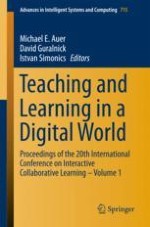2018 | OriginalPaper | Chapter
A Remote Mode Master Degree Program in Sustainable Energy Engineering: Student Perception and Future Direction
Authors : Udalamattha Gamage Kithsiri, Ambaga Pathirage Thanushka Sandaruwan Peiris, Tharanga Wickramarathna, Kumudu Amarawardhana, Ruchira Abeyweera, Nihal N. Senanayake, Jeevan Jayasuriya, Torsten H. Fransson
Published in: Teaching and Learning in a Digital World
Publisher: Springer International Publishing
Activate our intelligent search to find suitable subject content or patents.
Select sections of text to find matching patents with Artificial Intelligence. powered by
Select sections of text to find additional relevant content using AI-assisted search. powered by
